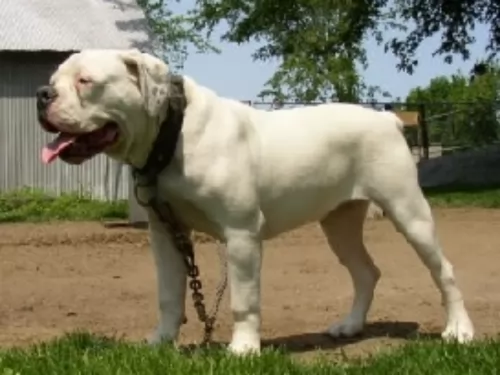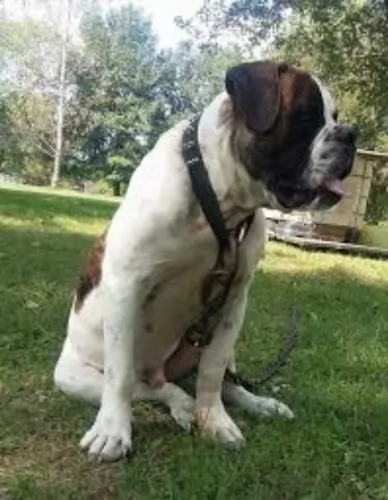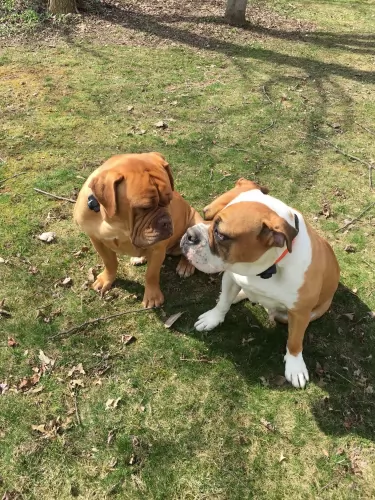 Petzlover
Petzlover Hermes Bulldogge is originated from United States but Nova Scotia Duck-Tolling Retriever is originated from Canada. Hermes Bulldogge may grow 9 cm / 4 inches higher than Nova Scotia Duck-Tolling Retriever. Hermes Bulldogge may weigh 45 kg / 100 pounds more than Nova Scotia Duck-Tolling Retriever. Both Hermes Bulldogge and Nova Scotia Duck-Tolling Retriever has almost same life span. Both Hermes Bulldogge and Nova Scotia Duck-Tolling Retriever has almost same litter size. Hermes Bulldogge requires Low Maintenance. But Nova Scotia Duck-Tolling Retriever requires Moderate Maintenance
Hermes Bulldogge is originated from United States but Nova Scotia Duck-Tolling Retriever is originated from Canada. Hermes Bulldogge may grow 9 cm / 4 inches higher than Nova Scotia Duck-Tolling Retriever. Hermes Bulldogge may weigh 45 kg / 100 pounds more than Nova Scotia Duck-Tolling Retriever. Both Hermes Bulldogge and Nova Scotia Duck-Tolling Retriever has almost same life span. Both Hermes Bulldogge and Nova Scotia Duck-Tolling Retriever has almost same litter size. Hermes Bulldogge requires Low Maintenance. But Nova Scotia Duck-Tolling Retriever requires Moderate Maintenance
 The Hermes Bulldogge is not a breed in itself, but is actually a line within the English Bulldogge line. The Hermes family in the United States bred this line for several years. The Hermes Bulldogge line is the largest of the re-creations from the English Bulldogge. They are inspired by the arena dogs from the days of the Roman Empire. Greg and Linda Hermes have bred healthy, smart, resilient and agile dogs. The desire of the Hermes was an attempt at recreating the 17th century dog.
The Hermes Bulldogge is not a breed in itself, but is actually a line within the English Bulldogge line. The Hermes family in the United States bred this line for several years. The Hermes Bulldogge line is the largest of the re-creations from the English Bulldogge. They are inspired by the arena dogs from the days of the Roman Empire. Greg and Linda Hermes have bred healthy, smart, resilient and agile dogs. The desire of the Hermes was an attempt at recreating the 17th century dog.
They used a variety of breeds to create the Hermes Bulldogge, most of whom are never disclosed. Some of the dogs that were probably used include: English Mastiffs, American Bulldogs, Old English Bulldogges, and pit Bull Terriers. This family of dogs are playful, friendly, and good family dogs. They have a strong prey drive which makes them good hunters but not as good around other small animals or small children. The Hermes have been breeding the Hermes Bulldogge since since 1983. The puppies are all hand raised, child friendly with great health.
When discussing the Hermes Bulldogge, one must go back to the root of the English Bulldogge. That breed comes originally from England and various lines have been recreated by various breeders. The breeding of the Old English Bulldogge with Mastiffs and Pits lead to other lines that the breeders called Old English. But most fanciers believe that only two lines of the original Old English Bulldogge remain and that is the Leavitt and the Hermes.
Some form of bulldog has been in existence since 700 years ago and as it was mixed with a variety of other breeds it took on other forms over time. The English Bulldogge was a definite couch potato. Instead of being bred for a job or look, the Bulldogge was developed with temperament, ability and health in mind. This has made for a great family dog without a lot of veterinarian bills.
 The Nova Scotia Duck Tolling Retriever dog was bred in the 19th-century in Nova Scotia, Eastern Canada.
The Nova Scotia Duck Tolling Retriever dog was bred in the 19th-century in Nova Scotia, Eastern Canada.
They were used as hunting dogs. Known as the ‘Toller’, the dog was at first referred to as the Little River Duck Dog but it was in 1945 that it became officially recognized by the Canadian Kennel Club as a pure breed.
The dog is a mix of retriever, setter, spaniel and possibly a farm collie mix breed. It was in 1980 that the breed gained national recognition, being declared the provincial dog of Nova Scotia in 1995.
 The Hermes Bulldogge, much like the original Olde English Bulldogge, is taller, healthier, more athletic than the original English Bulldog. They are medium height, with a large head, a strong body and a deep, wide chest and broad shoulders. Tails might or might not be docked but the ears are never docked. They n have a moderate amount of wrinkles and a longer, less smashed face than the original. It is easier for the Hermes Bulldogge to breath, to fly and to live in warmer environments that it is for the English Bulldogge. His eyes are lower in his head but in the front center.
The Hermes Bulldogge, much like the original Olde English Bulldogge, is taller, healthier, more athletic than the original English Bulldog. They are medium height, with a large head, a strong body and a deep, wide chest and broad shoulders. Tails might or might not be docked but the ears are never docked. They n have a moderate amount of wrinkles and a longer, less smashed face than the original. It is easier for the Hermes Bulldogge to breath, to fly and to live in warmer environments that it is for the English Bulldogge. His eyes are lower in his head but in the front center.
They are very dark almost black. Eyelids should cover the white of the eye and they have rounded cheeks. They have a short muzzle and short face. Broad, thick lips finish out the face with very large, square, broad jaws.
 The Nova Scotia Duck Tolling Retriever is a medium-sized gundog. Both male and female stand at about 42 to 54cm in height and they weigh anything from 17 to 23kg.
The Nova Scotia Duck Tolling Retriever is a medium-sized gundog. Both male and female stand at about 42 to 54cm in height and they weigh anything from 17 to 23kg.
This beautiful dog is looked upon as the smallest of the retriever dogs. He has a remarkable medium-length, feathery red, copper or golden coat with some white markings and a long feathery tail with medium length, floppy ears. The coat will need brushing twice a week.
He is a powerful dog and also agile with a somewhat worried expression on his face. The expression becomes bright and animated when he is busy working and you’ll notice that the feathery tail is held high with confidence and delight when he is busy working or doing some activity he loves.
The Nova Scotia Duck Tolling Retriever is an intelligent, alert dog who is eager to please its owners.
They are affectionate dogs too, making a splendid family pet. If you’ve got kids in the home, you can trust this dog to get on well with them.
He is energetic, thriving on both physical and mental stimulation. He’ll love a walk every day as this will give him the chance to get out and sniff around. He won’t be content though with just a walk and will want ball games, walks in the park, hikes and swimming. This dog loves water and is well equipped for it with his double coat and webbed paws.
 If socialized properly this line of bulldog is harmful to me.
If socialized properly this line of bulldog is harmful to me.
Strong and athletic, his strength and stamina.
He is not very adaptable. Apartments are not good for this dog. He needs to run and if possible to hunt.
He is very intelligent but stubborn which affects his learning ability.
 Your Toller is a high energy dog, and with the right family he is going to be an absolute joy to have. Give him lots of activities to stimulate him physically and mentally as he is an intelligent dog.
Your Toller is a high energy dog, and with the right family he is going to be an absolute joy to have. Give him lots of activities to stimulate him physically and mentally as he is an intelligent dog.
He is playful and social and full of life, although he is wary around strangers. Just like with most dogs, he will need training and socialization to round him off, making him obedient and well balanced.
With this good-natured pet, you will have a wonderful family friend and enthusiastic sport companion.
 The Hermes Bulldogge is healthier than most bulldogs. His face is not as smashed and he is not as wrinkled. He can breathe easier than other Bulldogs. The two major concerns are hip dysplasia and bloat.
The Hermes Bulldogge is healthier than most bulldogs. His face is not as smashed and he is not as wrinkled. He can breathe easier than other Bulldogs. The two major concerns are hip dysplasia and bloat.
Hip Dysplasia also some elbow dysplasia: can cause lameness and arthritis
Terminal unless treated immediately. Can be prevented by not feeding large meals before or after heavy exercise.
 These dogs are robust, but certain genetic disorders do occur in the breed because of the smallish gene pool. Some of the biggest health problems they face are hip dysplasia and progressive retinal atrophy.
These dogs are robust, but certain genetic disorders do occur in the breed because of the smallish gene pool. Some of the biggest health problems they face are hip dysplasia and progressive retinal atrophy.
This eye disease is all about a group of degenerative eye disorders that cause blindness in both eyes of the dog.
The first symptom of this disease is night blindness where you see your dog being reluctant to go outside or to go up and down stairs in dim light. The surface of the eyes will get that cloudy, glazed-over look and as the disease progresses, you’ll find your pet bumping into things.
Mercifully it isn’t painful but you will need to get your pet to the vet to manage the condition.
 When feeding a Hermes Bulldogge puppy be sure you feed puppy meal for bulldogs or medium dogs. For first year fee 2-4 times a day 2 cups food.
When feeding a Hermes Bulldogge puppy be sure you feed puppy meal for bulldogs or medium dogs. For first year fee 2-4 times a day 2 cups food.
Feed the adult a solid adult dry food. 2 cups twice a day.
Better health than most lines of Bulldogs. Few wrinkles and less problems breathing as he doesn’t have a smashed face.
He doesn’t need a lot of exercise but daily walks and lots of play time. He can enjoy Lure Coursing obedience, agility and obedience
 Tollers are energetic dogs and you won’t have to extend a second invitation to this dog to join you on your walks, hikes, hunting and swimming. It is perhaps why he is better suited to country living as opposed to living in the city.
Tollers are energetic dogs and you won’t have to extend a second invitation to this dog to join you on your walks, hikes, hunting and swimming. It is perhaps why he is better suited to country living as opposed to living in the city.
You want to ensure the best food for your four-legged friend, but the idea is to keep things simple and nutritious for your dog.
Your pet can’t tell you when he’s got a stomach-ache from eating the wrong foods so you have to be careful what you feed him. You want to make sure that the food you give your dog is balanced for the stage of life he or she is in – puppy, young adult, pregnancy, ill dog or senior dog.
You’ve also got to see whether your dog is small or large, active or a couch-potato type of dog, and choose commercially manufactured foods that cater for the kind of dog he is.
It is fine to feed your dog a kibble food or you can mix in some chopped up boiled chicken, brown rice or pasta and some vegetables such as carrots, sweet potatoes and spinach. Some raw meat added in when you can afford it, will also do your pet the world of good.
You can see from this diet, it is uncomplicated, plain, wholesome food and will do your pet good.
Always be careful of bones with your dog and speak to your vet first before you opt to give your dog bones.
Never leave your pet without a constant supply of fresh, cool water.
Both dogs and owners benefit when a dog has been trained and socialized. The dog is balanced and obedient and a stronger relationship develops between owner and dog because of the dog being well behaved. The Nova Scotia Duck-Tolling Retriever is an intelligent dog so he won’t have any trouble with training.